Jaymnj
Welcome to my shop. Get the grades you deserve and optimize your study time using my resources. Wishing you luck
- 789
- 0
- 63
Community
- Followers
- Following
49 Reviews received
853 items
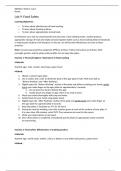
BIOS 242 Week 5 Assignment; Lab 9 of 14 Onsite; Food Safety.
BIOS 242 Week 5 Assignment; Lab 9 of 14 Onsite; Food Safety. Lab 9: Food Safety Learning Objectives: To learn about effectiveness of hand washing To learn about cleaning produce To learn about appropriately storing foods GI infections occur due to contaminated food and water. Clean drinking water, washed produce, appropriate storage of food and simple personal hygiene habits such as hand washing help tremendously in reducing the incident of GI infections. In this lab, we will test the ef...
- Other
- • 7 pages •
BIOS 242 Week 5 Assignment; Lab 9 of 14 Onsite; Food Safety. Lab 9: Food Safety Learning Objectives: To learn about effectiveness of hand washing To learn about cleaning produce To learn about appropriately storing foods GI infections occur due to contaminated food and water. Clean drinking water, washed produce, appropriate storage of food and simple personal hygiene habits such as hand washing help tremendously in reducing the incident of GI infections. In this lab, we will test the ef...

BIOS 242 Week 4 Assignment; Lab 8 of 14 Onsite; Fomite Transmission.
BIOS 242 Week 4 Assignment; Lab 8 of 14 Onsite; Fomite Transmission Learning Objectives: Define fomite and how bacteria are transferred via fomites. Explain the role of fomite transmission in the hospital. Define nosocomial infections, HAIs (hospital acquired infections), and Iatrogenic infections. Introduction: Materials: Agar plate, Marker, ruler, sterile swabs Method: Obtain one nutrient agar and divide the back of the plate into 8 sections using ruler and marker. Label ...
- Other
- • 2 pages •
BIOS 242 Week 4 Assignment; Lab 8 of 14 Onsite; Fomite Transmission Learning Objectives: Define fomite and how bacteria are transferred via fomites. Explain the role of fomite transmission in the hospital. Define nosocomial infections, HAIs (hospital acquired infections), and Iatrogenic infections. Introduction: Materials: Agar plate, Marker, ruler, sterile swabs Method: Obtain one nutrient agar and divide the back of the plate into 8 sections using ruler and marker. Label ...
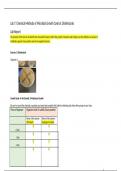
BIOS 242 Week 4 Assignment; Lab 7 of 14 Onsite; Disinfectants and Antibiotics
BIOS 242 Week 4 Assignment; Lab 7 of 14 Onsite; Disinfectants and Antibiotics Lab Report: Disinfectants and Antibiotics Purpose: Describe the purpose of the lab. Exercise 1: Disinfectants Organism 1: Be sure to record the chemical or product you tested and complete this table by obtaining data from other groups in your class Organism 2: Be sure to record the chemical or product you tested and complete this table by obtaining data from other groups in your class Q...
- Other
- • 6 pages •
BIOS 242 Week 4 Assignment; Lab 7 of 14 Onsite; Disinfectants and Antibiotics Lab Report: Disinfectants and Antibiotics Purpose: Describe the purpose of the lab. Exercise 1: Disinfectants Organism 1: Be sure to record the chemical or product you tested and complete this table by obtaining data from other groups in your class Organism 2: Be sure to record the chemical or product you tested and complete this table by obtaining data from other groups in your class Q...
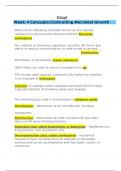
BIOS 242 Week 4 Assignment; Concepts; Controlling Microbial Growth.
BIOS 242 Week 4 Assignment; Concepts; Controlling Microbial Growth. Prepare: Controlling Microbial Growth The sterilizing gas used in chemiclaves is . HEPA filters are used to remove microbes from Which of the following microbial forms has the highest resistance to physical and chemical controls? Sterilization is achieved by The method of removing vegetative microbial life forms and debris to reduce contamination to safe levels is termed is a halogen used in gaseous and liq...
- Exam (elaborations)
- • 11 pages •
BIOS 242 Week 4 Assignment; Concepts; Controlling Microbial Growth. Prepare: Controlling Microbial Growth The sterilizing gas used in chemiclaves is . HEPA filters are used to remove microbes from Which of the following microbial forms has the highest resistance to physical and chemical controls? Sterilization is achieved by The method of removing vegetative microbial life forms and debris to reduce contamination to safe levels is termed is a halogen used in gaseous and liq...
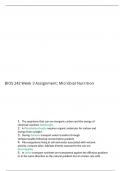
BIOS 242 Week 3 Assignment; Microbial Nutrition
BIOS 242 Week 3 Assignment; Microbial Nutrition The organisms that can use inorganic carbon and the energy of chemical reactions ______ . A ______ requires organic molecules for carbon and energy from sunlight. During ______ transport water transfers through semi permeable following concentration gradient. Microorganisms living in soil and water associated with volcanic activity, compost piles, habitats directly exposed to the sun are ______. In ______ transport nutrients are transported...
- Other
- • 2 pages •
BIOS 242 Week 3 Assignment; Microbial Nutrition The organisms that can use inorganic carbon and the energy of chemical reactions ______ . A ______ requires organic molecules for carbon and energy from sunlight. During ______ transport water transfers through semi permeable following concentration gradient. Microorganisms living in soil and water associated with volcanic activity, compost piles, habitats directly exposed to the sun are ______. In ______ transport nutrients are transported...
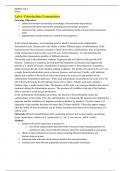
BIOS 242 Week 3 Assignment; Lab 6 of 14 Onsite; Carbohydrate Fermentation
BIOS 242 Week 3 Assignment; Lab 6 of 14 Onsite; Carbohydrate Fermentation Lab 6: Carbohydrate Fermentation Learning Objectives: Define fermentation and develop a knowledge of fermentation end products. Understand the theory behind the carbohydrate fermentation procedure. Understand the various components of the carbohydrate media and how these components work. Appropriately analyze results for a variety of microorganisms. In the clinical laboratory, one technique used to id...
- Other
- • 4 pages •
BIOS 242 Week 3 Assignment; Lab 6 of 14 Onsite; Carbohydrate Fermentation Lab 6: Carbohydrate Fermentation Learning Objectives: Define fermentation and develop a knowledge of fermentation end products. Understand the theory behind the carbohydrate fermentation procedure. Understand the various components of the carbohydrate media and how these components work. Appropriately analyze results for a variety of microorganisms. In the clinical laboratory, one technique used to id...
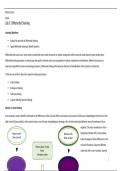
BIOS 242 Week 3 Assignment; Lab 5 of 14 Onsite; Differential Staining
BIOS 242 Week 3 Assignment; Lab 5 of 14 Onsite; Differential Staining Learning Objectives: Explain the principle of differential staining Apply differential staining to identify bacteria Differential stain uses two or more stains to specifically stain certain structures or cellular components which cannot be easily observed using simple stains. Differential staining principles are based upon the specific chemical nature and composition of cellular components and therefore, different s...
- Other
- • 18 pages •
BIOS 242 Week 3 Assignment; Lab 5 of 14 Onsite; Differential Staining Learning Objectives: Explain the principle of differential staining Apply differential staining to identify bacteria Differential stain uses two or more stains to specifically stain certain structures or cellular components which cannot be easily observed using simple stains. Differential staining principles are based upon the specific chemical nature and composition of cellular components and therefore, different s...
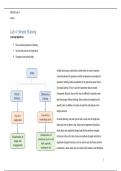
BIOS 242 Week 2 Assignment; Lab 4 of 14 Onsite; Simple Staining
BIOS 242 Week 2 Assignment; Lab 4 of 14 Onsite; Simple Staining Lab 4: Simple Staining Learning Objectives: To learn about principle of staining To learn the process of simple stain To prepare wet mount slides In light microscopy, colored dyes, called stains are used to improve contrast between the specimen and the background surrounding the specimen. Staining makes visualization of the specimen easier due to increased contrast. This is crucial for specimens that are mostl...
- Other
- • 15 pages •
BIOS 242 Week 2 Assignment; Lab 4 of 14 Onsite; Simple Staining Lab 4: Simple Staining Learning Objectives: To learn about principle of staining To learn the process of simple stain To prepare wet mount slides In light microscopy, colored dyes, called stains are used to improve contrast between the specimen and the background surrounding the specimen. Staining makes visualization of the specimen easier due to increased contrast. This is crucial for specimens that are mostl...
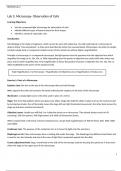
BIOS 242 Week 2 Assignment; Lab 3 of 14 Onsite; Microscopy Observation of Cells
BIOS 242 Week 2 Assignment; Lab 3 of 14 Onsite; Microscopy Observation of Cells Lab 3: Microscopy- Observation of Cells Learning Objectives: Use the compound light microscope for observation of cells. Identify different types of bacteria based on their shapes. Identify a variety of eukaryotic cells. Introduction: Microbiology is the study of organisms, which cannot be seen with naked eye. You will need help of a microscope to observe these “tiny animalcules” as they w...
- Other
- • 10 pages •
BIOS 242 Week 2 Assignment; Lab 3 of 14 Onsite; Microscopy Observation of Cells Lab 3: Microscopy- Observation of Cells Learning Objectives: Use the compound light microscope for observation of cells. Identify different types of bacteria based on their shapes. Identify a variety of eukaryotic cells. Introduction: Microbiology is the study of organisms, which cannot be seen with naked eye. You will need help of a microscope to observe these “tiny animalcules” as they w...
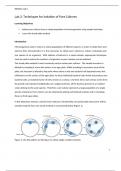
BIOS 242 Week 1 Assignment; Lab 2 of 14 Onsite - Isolation of Pure Cultures
BIOS 242 Week 1 Assignment; Lab 2 of 14 Onsite - Isolation of Pure Cultures Lab 2: Techniques for Isolation of Pure Cultures Learning Objectives: Isolate pure cultures from a mixed population of microorganisms using aseptic technique. Learn the streak plate method Introduction: Microorganisms exist in nature as mixed populations of different species. In order to study them and observe their characteristics it is first necessary to obtain pure cultures (a culture ...
- Other
- • 10 pages •
BIOS 242 Week 1 Assignment; Lab 2 of 14 Onsite - Isolation of Pure Cultures Lab 2: Techniques for Isolation of Pure Cultures Learning Objectives: Isolate pure cultures from a mixed population of microorganisms using aseptic technique. Learn the streak plate method Introduction: Microorganisms exist in nature as mixed populations of different species. In order to study them and observe their characteristics it is first necessary to obtain pure cultures (a culture ...

Makayla Henderson Documentation
Conditions of the Musculoskeletal and Neurovascular Systems Results-Differential Selection
Conditions of the Musculoskeletal and Neurovascular Systems Results-Final Diagnosis
NR 605 Week 8 Reflection
good
Respiratory System Hourly Rounds Results